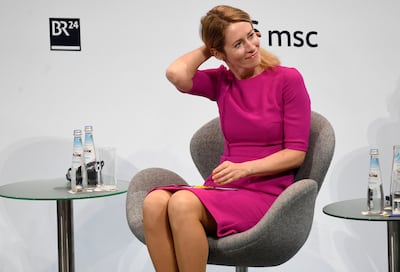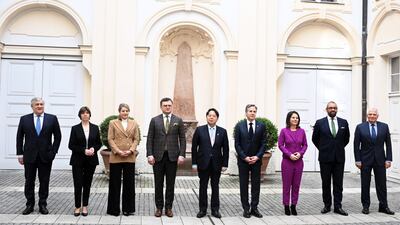The war in Ukraine presents Europe with a three-stage challenge it must overcome to see off Russia's threat to the continent's security, the foreign affairs chief of the 27-nation EU said on Sunday.
Josep Borrell, the EU's high representative, told the Munich Security Conference that the region was in "war mood" and must act quickly to secure its future, particularly by rapidly increasing supplies of weapons to Ukraine.
"Much more has to be done and much quicker," he said. "There is still a lot to be done. We have to increase and accelerate our military support."
While hailing the efforts to shore up its ally in Kyiv and reduce dependence on Russia gas exports to almost nil in only 12 months, Mr Borrell set out what needs to be done by the members.
"Short term we need ammunition," he said. "Medium term we need greater capacity in our defence industry. And from now, from tomorrow and for a long time, to look at our partners in [the developing world] in order that they participate in the world reaction against Russia for starting the war in Ukraine.
"We cannot think about European security without looking beyond and engaging with partners from around the world," he said. "Travelling around the world I see how powerful is the Russian narrative that wants to reduce the war in Ukraine to a conflict between the West and Russia and I hear a lot of accusations of double standards. We must debunk this narrative."

Swedish Prime Minister Ulf Kristersson said the officials he met last week in Ukraine were concerned that European supplies were not arriving quickly enough. "I was in Kyiv two days ago and they were saying 'you do deliver weapons but you send weapons too late, too reluctantly, instead of doing it earlier and more decisively'.
Mr Borrell highlighted a big increase in defence spending in Europe announced by member states, referring to the one-off, €100 billion special budget allocated by Germany, which is also committed to raising its annual defence spending to 2 per cent of GDP. Poland has announced it will raise spending to 4 per cent of its GDP. Mr Borrell also pointed out that military spending in France was rising from pre-war €39 billion to €59 billion. All told, Europeans plan to spend an additional €70 billion in the annual outlay but much of that is not feeding into defence industry supply lines, with the first anniversary of the Russia invasion to be marked on Friday.
Kaja Kallas, the Estonian Prime Minister, warned that despite this uplift the scale of Russia's commitment to the war effort was not being matched. "The Russian military industry is working in three shifts," she said. "Russia is firing the monthly European production of artillery shells in a day.
"If you read the room in terms of the trends in Europe, there is clearly a demand and in a market economy when there's demand there also [needs to] be an increase in the capacity. So make it faster. Make it faster because Ukraine must be able to defend themselves to win this war so that Russia goes back to their borders. And this is not possible without the ammunition."
Ms Kallas has called for a Covid vaccine-style drive by Brussels to rapidly expand weapons and ammunition production in the weeks ahead and Mr Borrell said: "I completely agree with the Estonian Prime Minister's proposal and we are working on that — and it will work."

Mr Borrell said he had rebutted the offer from Wang Yi, the Chinese state counsellor, for Europeans to assert their strategic autonomy from the US by "thinking calmly" about what kind of efforts would bring peace in Ukraine.
"European leaders here said yesterday that Russia cannot win this war and that Ukraine has to prevail," he said. "Then let's go from the words to the facts and accelerate our military support to Ukraine."
Ukrainian Foreign Minister Dmytro Kuleba, meanwhile, told the meeting that ammunition was a "critical issue" that he had discussed with defence industry leaders at the Munich conference. "I received assurances — and I have specific numbers — about the quantities that can be produced," he said later. "The questions are contracting them, financing and logistics."


